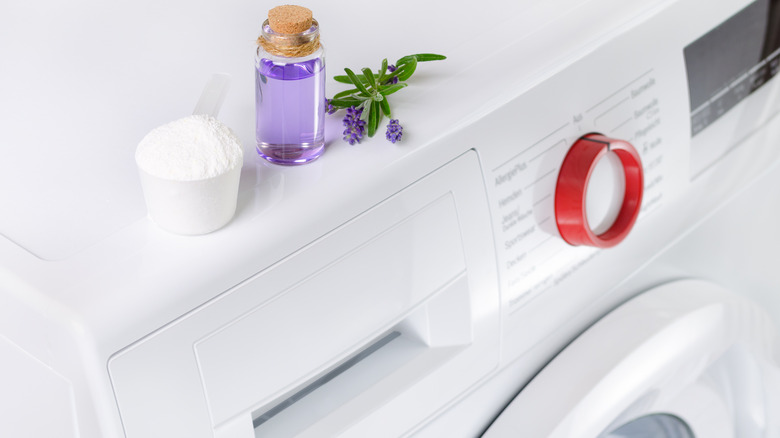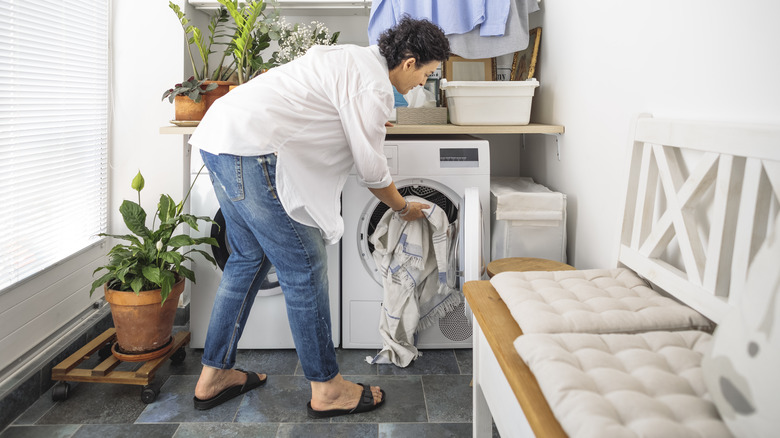Why You Want To Rethink Using Essential Oils In Your Laundry
Many people are beginning to transition away from using harsh fragrances in their laundry detergents and softeners and are instead opting for more natural, environmentally friendly alternatives. And while ditching the scented chemicals in large plastic jugs is a better idea for both your skin and the environment, many people find their clothes not smelling as fresh without them, prompting them to want to reintroduce a pleasant scent to their laundry through the use of essential oils.
Though essential oils smell nice and are great to use in various areas of the home, it's important to remember that they are still incredibly potent and should be used carefully. Some are regarded as being flammable when exposed to temperatures over a certain degree. Because the temperature inside your dryer can get extremely hot when drying your clothes, adding certain essential oils to the inside of the drum prior to running the machine can actually be a very serious fire hazard.
Due to the low flash points of some essential oils, which is the temperature at which the vapor of the oil can ignite, it's best to avoid putting them directly in the dryer — especially on high heat. While it's possible to incorporate the use of essential oils into certain steps of your laundry routine safely, it's important to be safe and do so at your own risk.
The dangers of adding essential oils to your dryer
While the water in the washing machine prevents essential oils from catching fire when used during this stage of your laundry routine, the same can't be said for the dryer, which does not use any water that could prevent a potential fire. "Some dryers heat up to about 57 °C (134 ºF) which is above the flashpoint for some essential oils," says Michael Papeo, captain of public education for Toronto Fire Services (via Reader's Digest). Many essential oils have notably low flash points, with quite a few falling anywhere from 38-54 ºC (102-130 ºF). This makes it easily possible for the oils to catch fire in the dryer if allowed to reach a certain temperature.
Some of the most flammable essential oils are citrus oils like lemon and orange, tea tree, lavender, clove, frankincense, juniper, rosemary and eucalyptus. Oils containing fir, spruce, and pine are also known to have low flash points. If you aren't sure whether or not a certain essential oil is flammable, it's always a good idea to look it up before using it, even if you just plan on using it in the washing machine. Not all traces of essential oils will completely wash off from clothing in the wash, and if you added too much, the amount that is left behind on the fabric when it gets tossed into the dryer can be dangerous if dried on high heat.
What to do instead
If you are cutting out the use of harsh fragrances in traditional detergents and softeners but still want your clothes to have a fresh scent after going through a laundry cycle, the easiest and safest option is to simply add a few drops of your favorite essential oils to your washing machine along with your detergent.
Alternatively, you can add a few drops of your preferred essential oil to some wool dryer balls and add them in with your clothes while they dry. This will help freshen up your clothes and other linens with a pleasant scent while also helping cut down on drying time and reducing wrinkles. Make sure you aren't adding too much, as this can increase the risk of a potential fire hazard. If you choose to add a small amount of essential oils to your wool dryer balls, it's a good idea to use medium or low heat just in case, especially if you aren't sure whether or not the oil you are using has a low flash point. If you need to dry your clothes quicker and on higher heat, dry them completely on high before adding the essential oils to the wool balls and running the dryer for a while longer on the coolest heat setting.
To be completely safe, you can add a few drops of your favorite essential oil to a spray bottle full of water and shake it up before spritzing it onto your clothes after they are finished drying.



